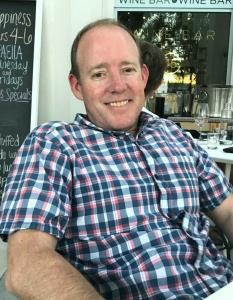Brent Weatherly: Battling Colon Cancer With Faith, Friends & Family Support
 Brent Weatherly
Brent Weatherly
The American Cancer Society recommends that men and women at average risk for colon cancer get a colonoscopy starting at age 50. But at age 43, Brent Weatherly of Bishop was experiencing symptoms that he assumed were caused by an ulcer, so the gastroenterologist he visited did a colonoscopy. Unfortunately, it found an abnormally shaped ball attached to the lining of the bowel, which later proved to be colon cancer. And he’s been fighting the battle ever since. “Ultimately, it seems that cancer has a firm hold in my body, though at this point much of it is too small to be seen by current imaging,” Brent says.
April 11, 2013 started out normally enough. Brent and his wife were preparing for their then 10-year-old twins' birthday party. The high school sweethearts also have two other children, then 12 and 8. Brent had an appointment with a gastroenterologist to see about the dull pain he was experiencing in his stomach; the doctor had presumed the symptoms were related to some minor ailment. But the procedure showed a dark gray area signifying a growth in the lower part of the colon.
“I remember his saying that he didn't think it was a major problem. I'd have surgery and maybe chemotherapy, but he assured me that this would be just a "blip" in our lives,” he says. The Weatherlys were stunned and dazed by the news; there had been no family history of colon cancer, though, not long after his diagnosis, his cousin was also diagnosed.
“We didn't have the luxury of processing time; we had to carry on with the "normal" stuff of life of a family of six,” he says. And that began that afternoon with a birthday party for the twins.
The unfolding of the reality of his condition has been slow, but seemingly always worse than previously thought. Before surgery, a CT scan didn't reveal much, primarily the mass and an enlarged lymph node or two. However, the pathology report from the 16 lymph nodes removed during surgery showed that 12 were cancerous. So the diagnosis was Stage IIIc. They digested that news, taking some small comfort in that it wasn’t Stage IV, and put their hope in the efficacy of chemotherapy. After recovery, he received 6 months of chemotherapy, at the end of which a CT scan showed "no evidence of disease."
Unfortunately, 6 months later, another CT scan at the oncologist’s office showed a small mass outside of the colon. A subsequent PET scan revealed cancer activity in distant lymph nodes. The reality sunk in, it was Stage IV from the journey's beginning. And, for the next four years, Brent’s treatment has involved multiple surgeries, radiation and a number of therapies at hospitals near and far.
Fast-forward to today, Brent’s tumor still exists, and he is still fighting, now with experimental medicine from a phase Ib trial under the direction of an oncologist from the Sarah Cannon Cancer Center in Nashville, TN. The good news is that these treatments thus far have been effective.
Brent shares his story to help those newly diagnosed in their journey. He blogs regularly at https://twostories.blog/ “This has been a constant battle for my family, but we live with hope that stems from a strong faith and involvement with our church and our children’s school, where we’ve been surrounded by loving people that have selflessly attended to our physical, emotional and spiritual needs,” he says.
“I've had help from family members, friends, and co-workers, too, and a great job that has given me the time and space needed for treatment and recovery,” he says. For those starting their journey, he recommends researching and visiting doctors, if only for second opinions, and to have future options. Genetic testing allowed his doctors to rule out therapies that would likely be of no benefit and to identify targets for future drugs. He also found it important to be educated enough to have intelligent conversations with his health care team, but he doesn’t recommend scouring the Internet, though, saying that it has almost always left him feeling discouraged.
Back to Survivors' Voices